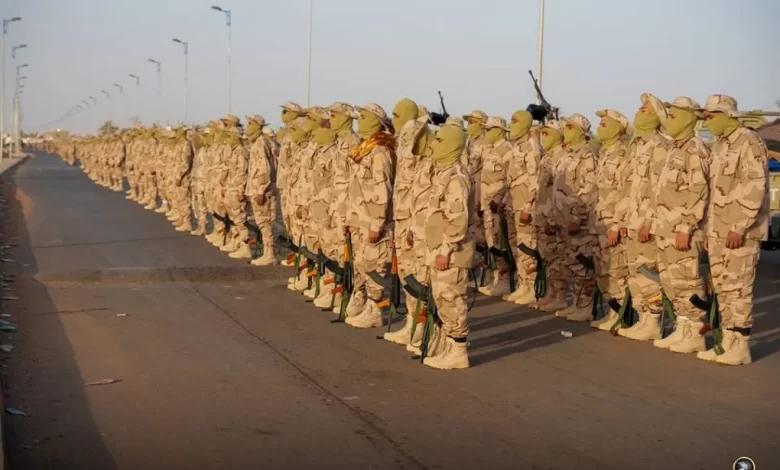Is Field Marshal Haftar’s Forces Really Fighting in Sudan?

Sudan Events – Agencies
The Sudanese army’s accusation of the Libyan National Army (LNA) of “providing support to the Rapid Support Forces (RSF) in armed clashes in a border area” has raised many questions about Field Marshal Khalifa Haftar’s alleged involvement in the Sudanese war.
A Libyan military source dismissed the Sudanese army’s accusations as “an attempt to shuffle the cards due to its failure to decisively win its battle against the RSF,” asserting that “the Libyan army has not intervened in Sudan.”
This marks the first direct accusation against the LNA, which is based in eastern Libya and led by Field Marshal Khalifa Haftar, of supporting the RSF in its war against the Sudanese army since the outbreak of civil war in Sudan in April 2023. Notably, Sudanese sources and activists have long promoted such claims, which have typically been denied by the Libyan side.
Following the Sudanese army’s accusation that the RSF and a Libyan military group attacked army posts at the border triangle between Sudan, Egypt, and Libya, the Sudanese army announced on Wednesday that it had withdrawn from the area as part of “defensive arrangements.” Meanwhile, the RSF claimed control over the region.
The Sudanese Ministry of Foreign Affairs also stated that a force affiliated with the Libyan National Army was involved in what it described as “a blatant assault on Sudanese sovereignty and a serious threat to regional and international security,” calling on the international community, the United Nations, the African Union, and the Arab League to condemn the attack and respond firmly and seriously.
In response, the General Command of the Libyan National Army issued a statement on Wednesday, circulated by local media, claiming that its border patrols had come under attack from Sudanese forces while securing the Libyan side of the border. It also noted that Sudanese forces had “repeatedly violated the Libyan border,” adding that “we are handling the situation calmly.”
The Government of National Unity (GNU), meanwhile, said the armed group accused of involvement in military operations on the Sudanese border “is not affiliated with the Libyan Ministry of Defense.”
The Libyan army’s statement stressed: “We have never posed a threat to our neighbors; rather, we are keen on ensuring stability and border security,” warning that “Libya is among the countries most affected by the ongoing catastrophic conflict in Sudan.”
Several Libyan voices expressed surprise at Sudan’s repeated accusations that the Libyan army is involved in the Sudanese conflict. Libyan political analyst Mohammed Mtairid described the claims as a “media offensive by certain Sudanese parties trying to draw international and regional actors into the internal conflict.”
Speaking to Asharq Al-Awsat, Mtairid said the Libyan army “remains stationed in the Jabal al-Uwaynat Triangle at the border between Sudan, Egypt, and Libya,” noting that “border patrols operate within each country’s area of control.”
He recalled that there had been previous attempts to drag the Libyan army into the Sudanese conflict, but that it had “been more adept at avoiding direct confrontation, knowing that any escalation in this sensitive area could lead to border and regional issues that would not serve any party.”
The “border triangle” between Sudan, Libya, and Egypt is known as a vital strategic point — a cross-border economic corridor connecting three countries and a commercial and logistical bridge between North and East Africa. It is also rich in natural resources, including oil, gas, and minerals.
Mtairid emphasized that the General Command of the Libyan army “distances itself from the Sudanese infighting,” citing the support the Sudanese community and displaced persons receive in cities like Benghazi, Tobruk, and Kufra.
The Libyan denial of Sudan’s accusations comes amid a broader national divide, with power contested between the Tripoli-based Government of National Unity, which is internationally recognized and led by Abdulhamid Dbeibeh, and a rival government in Benghazi (East), headed by Osama Hammad and backed by Khalifa Haftar.
However, Libyan diplomat Ibrahim Qarada has called for unity in the face of what he sees as an external threat. Commenting to Asharq Al-Awsat on these developments, he said: “The Sudanese conflict creeping toward the Libyan border — and the possibility of it spilling into Libya — is not a foreign issue that doesn’t concern us. On the contrary, it is a pressing duty to monitor and prevent its spread inside Libya.”



